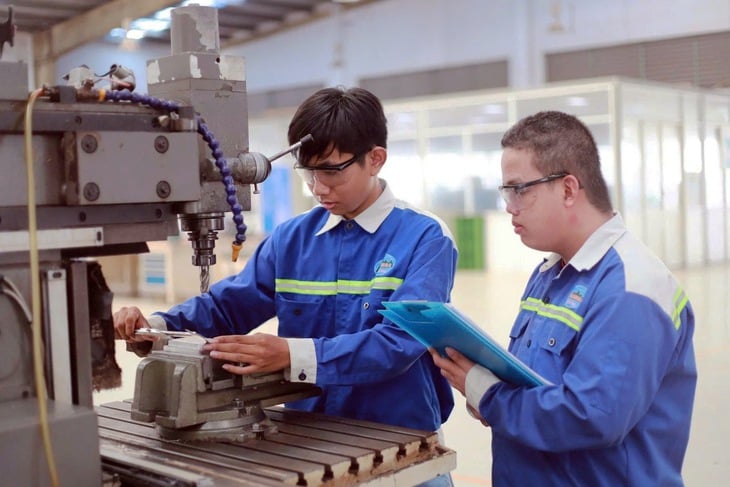
Students of Lilama 2 International College during a practical class - Photo: TRONG NHAN
Mr. Ha Van Quan, production manager of REGZA Vietnam Electronics Co., Ltd., said that currently, businesses have a great demand for highly skilled technical workers, especially in the fields of mechatronics, automation, electronic assembly and product quality inspection.
The demand for highly skilled labor is huge.
According to Mr. Quan, most employees, when hired, must undergo a 3-6 month retraining program to meet the group's own technical standards and processes. Even though they have basic skills, to meet the requirements of assembly techniques, testing or safety procedures, workers need to be retrained to suit the technology, equipment and operating culture. Personnel with innovative thinking or outstanding skills also have the opportunity to be sent to China for specialized training at the parent company.
However, Mr. Quan frankly admitted that finding and retaining high-quality human resources is a big challenge today. Many young people have good theoretical knowledge but lack practical experience, teamwork skills and low industrial style. Others have good skills but their foreign language and ability to access new technology are still weak, making it difficult to meet the requirements of international production lines.
Mr. Pham Tuyen, recruitment manager of Ton Nam Kim, said that the company produces according to international standards to export to more than 50 markets and every product detail must meet international standards. Thus, the team of engineers and technicians operating the production line must understand international standards, read technical documents of European suppliers, work according to procedures and maintain industrial discipline.
The pressure is even greater as the company is developing a new factory in Phu My (HCMC) and may need about 1,000 employees at many levels from operators, line leaders, technology engineers, maintenance engineers to production management team.
To solve this problem, Mr. Tuyen said that the company has proactively worked with a number of technical colleges and universities in the Southern region to recruit. Potential graduates will need to know technical expertise, understand industrial safety, be familiar with 5S and, most importantly, be willing to learn new technology.
How to cooperate with businesses?
Mr. Fang Neng, Deputy General Director of a manufacturing enterprise in Dong Nai , said that many foreign enterprises in Vietnam are currently in great need of workers who have both solid vocational skills and understand global industrial thinking.
In reality, recruiting enough people is difficult, but training them to meet global standards is even more difficult, because most new graduates still lack practical experience and are not used to working in an international industrial environment.
From this reality, Mr. Fang Neng believes that the solution lies in the implementation and operation of vocational training programs. Specifically, according to him, if they want students to be able to work immediately after graduation, technical colleges and vocational education networks must truly consider businesses as part of the training program. Students cannot just learn machines in school and then do internships in their final year, which is too late.
Internships at enterprises should be considered a continuous process, not a short-term experience. Right from the first year, students can go to the factory to observe and learn about 5S, safety, and production organization. In the second year, they can participate in supporting simple operations, learning about quality control or operating the production line. In the third year, when they have a foundation, they can truly practice independently and take on specific positions.
Mr. Dinh Truong Viet, Deputy General Director of Ishisei Vietnam Co., Ltd., said that a model that can be referred to is the cooperative vocational training between enterprises and schools (CVT). Currently, Ishisei Vietnam has participated in a cooperation program with Lilama 2 International College of Technology (Dong Nai), receiving students to practice at the factory, participate in teaching specialized subjects, providing technical guidance and assessing practical skills.
Instead of letting students only learn simulations on computers in school, businesses create conditions to bring them into real production lines to understand the production pace, safety standards and quality requirements of each product.
Each student is trained in a real-life environment, directly supervised by an engineer, and evaluated according to the company's standards. Many students, after completing the program, have been recruited by the company, continued advanced training, and participated in production for export to the Japanese market.
Win-win
According to Mr. Dinh Truong Viet, the two-way relationship between businesses and schools brings clear benefits to many parties. Businesses can "order" the right labor they need, proactively shorten internal training time and form an international standard working culture right from the start.
On the contrary, the school also improves the quality of training, helps the curriculum to be linked to practice, lecturers have access to new technology, and students have clear job opportunities after graduation.
Seminar "High-quality vocational training - Breakthrough in human resources in the new period"
The draft document of the 14th National Party Congress has a paragraph stating: "Develop a number of vocational training institutions, training sectors and occupations to reach the level equivalent to the region and the world ". To clarify the above spirit, and at the same time contribute perspectives to assess the current situation, challenges and high-quality vocational training models in Vietnam, Tuoi Tre newspaper organized a discussion with the theme "High-quality vocational training - Breakthrough in human resources in the new period" on November 11 in Ho Chi Minh City.
The seminar will be attended by representatives of the Department of Education (Central Propaganda and Mass Mobilization Commission), state management agencies, and representatives of colleges and enterprises. Experts will also propose mechanisms, policies, cooperation and regional linkages to develop highly qualified technical human resources. The seminar will be accompanied by Lilama 2 College, Industrial College 2 and Kim Oanh Real Estate Group.
Source: https://tuoitre.vn/do-mat-tim-lao-dong-tay-nghe-cao-20251108103024565.htm








![[Photo] Head of the Central Propaganda Department attends the opening ceremony of Lilama 2 International College](https://vphoto.vietnam.vn/thumb/402x226/vietnam/resource/IMAGE/2025/1/19/128b9b2278274345a2b7eec14ff0ebe7)

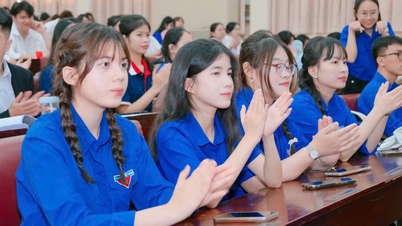

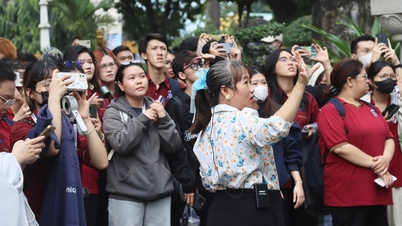






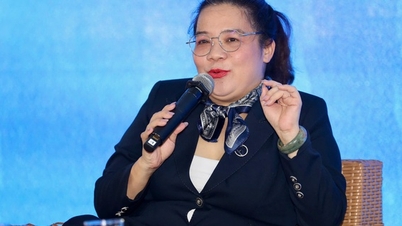




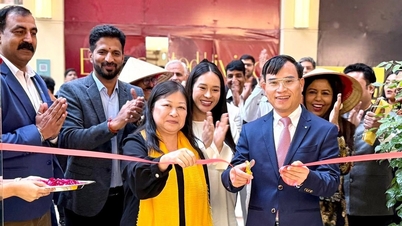









































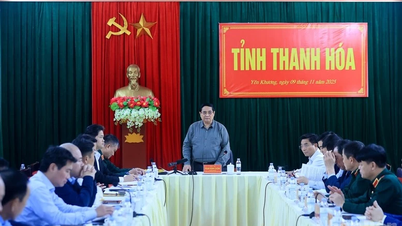




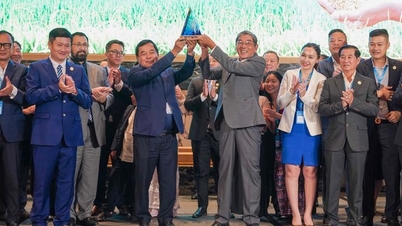





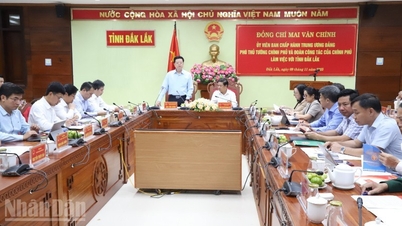

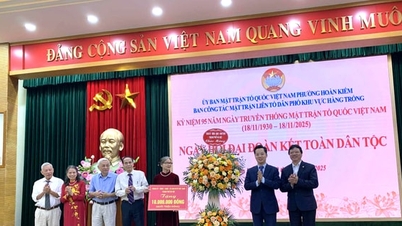



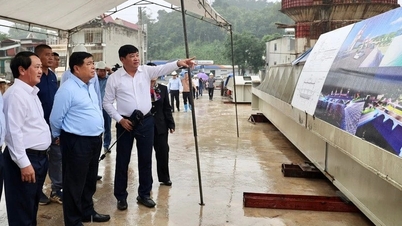


















Comment (0)